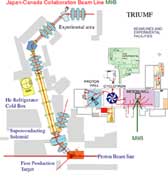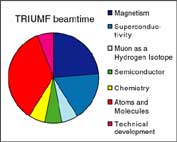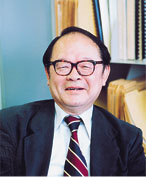
Japan-Canada Collaboration
Program at TRIUMF
All the activities of Japanese Meson (Muon) Science Researches have historically been initiated long time ago, namely in 1974, by the small experimental team called Tokyo group at TRIUMF situated inside the campus of the University of British Columbiai in the city of Vancouver, Canada. Successful developments of muon condensed-matter studies have triggered a construction of the present muon experimental facility at KEK in 1978.
 |
||||
| TRIUMF | ||||
Complimentary to pulsed muon experiments at KEK-MSL, experimental program with continuous muons is still actively in progress at TRIUMF mainly by using decay μ+/μ. beam from the Japan-Canada superconducting muon channel built during the period of 1986-1988.
Several μSR studies probing microscopic magnetic properties of condensed matter, in particular, heavy Fermion system, strongly correlated electron systems including colossalmagnet-resistance perovskite oxides, etc have been conducted.
Additionally, some experiments related to particle/nuclear/atomic physics have also been conducted, in particular, muon catalyzed fusion in ortho-para controlled solid-D2.
The allocated beam-time in each field of muon science for the KEK group (graph) demonstrates vivid activities of the collaboration program.
 |
|||
| TRIUMF beam time allocated for the KEK | |||
 |
The author of this article, professor Kanetada NAGAMINE, has been the director of Meson Science Laboratory since 1997. |
|||
-10-